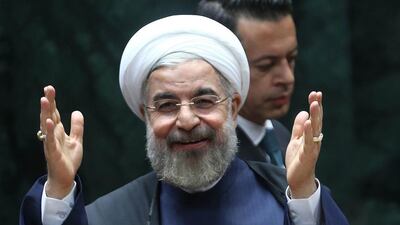TEHRAN // A year into Hassan Rouhani’s presidency, the high expectations and hope that led to his election have given way to impatience from his supporters and mounting criticism from conservative critics.
Nearly 51 per cent of voters, many of them young, elected Mr Rouhani last June, drawn by his moderate approach, pledges to implement social reforms and improve the economy by ending Iran’s international isolation.
“I’m dealing with different problems in my life, unemployment is the worst one,” said Ehsan, 32, an unemployed architect.
“But I voted for Rouhani because I was tired of hearing negative news abut Iran and I knew he would bring our respect back.”
Iran’s economy is struggling with high unemployment, inflation, and the rising cost of housing.
Mr Rouhani promised to combat these issues by re-engaging with the international community and ending years of crippling sanctions over Iran’s nuclear programme, on which his predecessor Mahmoud Ahmadinejad had taken a hard line.
“One way to resolve unemployment is to reach a deal in nuclear negotiations,” Mr Rouhani said on Saturday in his second press conference since his inauguration last August.
“Because when the sanctions are lifted, investments will flow to our country.”
His efforts so far have resulted in an easing of sanctions under a temporary nuclear deal. This has given Iran access to several billion dollars in frozen assets and allowed a resumption of imports of much-needed aircraft parts and transactions in precious metals such as gold.
Iran and six world powers meet again in Vienna on Monday for five days of negotiations aimed at resolving the dispute over Iran’s nuclear programme and reaching a permanent deal before the July 20 deadline.
However, some say that Mr Rouhani and his administration have not yet begun to address, let alone resolve, Iran’s problems.
Conservatives have strongly criticised his nuclear negotiating team’s approach, accusing them of rushing into a deal that does not favour Iran and gives up the country’s nuclear rights.
The mounting criticism from his conservative rivals is a political threat for Mr Rouhani, especially when joined by perceptibly louder dissatisfaction from other Iranians over the lack of progress with social and cultural reforms.
“His performance in the first year was such that people are recalling Ahmadinejad’s presidency as Iran’s golden days and wish he would come back,” said Ruhollah Hosseinian, a conservative cleric and MP from Tehran.
An adviser to Mr Ahmadinejad, Ali Akbar Javanfekr, has hinted that the former president might run for a third term in 2017. The constitution allows a maximum of three presidential terms but not more than two consecutively.
Fariba, 45, a telecommunication company employee said Mr Rouhani “hasn’t done anything about social freedoms”.
“Every day we wake up and we hear about someone being arrested. Those 18 million people who voted for him deserve more than words and promises.”
Since Mr Rouhani’s election a handful of political prisoners have been released, including Nasrin Sotoudeh, a human rights lawyer and activist, who was arrested in 2010 and sentenced to six years in prison on charges of threatening national security.
Her release just days before Mr Rouhani’s visit to New York for the UN General Assembly last September was received positively by many Iranians, but many other political prisoners remain in jail.
Little has happened since then, although Mr Rouhani promised again on Saturday to follow up the release of prisoners.
But neither the security services nor the judiciary are under the president’s control, and both seem determined to contain Mr Rouhani’s efforts to open up the political system.
Still, the international community, which suspects Tehran’s nuclear programme is aimed at developing weapons capability rather than peaceful uses as it claims, has welcomed Mr Rouhani’s attempts to resolve the issue.
His efforts to re-engage with the world include a historic phone conversation with the US president Barack Obama while in New York, resuming relations with the Gulf Arab states, and recent visits from key political figures including EU foreign policy chief Catherine Ashton and the Emir of Kuwait, along with rekindling strong ties with Turkey.
“Our strategy is to make the world know that we are determined to have a constructive interaction with the rest of the world. The permanent nuclear deal can be the first step in this interaction with the world,” Mr Rouhani said on Saturday, while expressing hope this would happen in the next five weeks.
Now, the question for Mr Rouhani’s supporters is whether his political strength would be solidified by a successful nuclear deal and allow him to make other reforms.
If not, the nuclear issue might be the only one to define his presidency.
“Nuclear is not the only issue in our country. People want him to pay a closer attention to everyday problems. What if this deal never happens? We cannot even pay our rent every month and all Rouhani talks about is the nuclear deal,” said Afshar, 41, a janitor with a degree in literature and two children.
foreign.desk@thenational.ae

